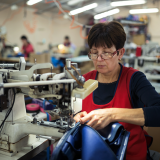
Arbetsmarknadsrelationer och social dialog
Arbetsmarknadsrelationer och social dialog är en av sex huvudsakliga verksamheter i Eurofounds arbetsprogram för perioden 2021–2024. Eurofound kommer att fortsätta fungera som ett kompetenscentrum för övervakning och analys av utvecklingen inom system för arbetsmarknadsrelationer och social dialog på nationell nivå och EU-nivå. Eurofound kommer även att fortsätta stödja dialogen mellan arbetsmarknadens parter, bland annat mot bakgrund av effekterna av covid-19, med hjälp av sakkunskap från nätverket av Eurofounds korrespondenter på nationell nivå.
Under de kommande fyra åren kommer Eurofound att ge viktiga insikter i utmaningarna och framtidsutsikterna på området arbetsmarknadsrelationer och social dialogi EU. Med sin långa expertis på detta område utforskar Eurofound den viktigaste utvecklingen som påverkar aktörer, processer och centrala resultat vad gäller arbetsmarknadsrelationer. Eurofound jämför nationella system för arbetsmarknadsrelationer, inklusive den nationella sociala dialogen och kollektiva förhandlingar. Genom att bygga vidare på sin databas COVID-19 EU PolicyWatch, som skapades 2020, kommer Eurofound att övervaka politiska initiativ av regeringar, arbetsmarknadens parter och andra aktörer för att motverka de sociala och ekonomiska konsekvenserna av krisen samt bidra till återhämtningen. Eurofound kommer att fortsätta att regelbundet rapportera om utvecklingen inom lönebildning, minimilön och arbetstid och även om resultat som avser arbetslivet.
Med sin sakkunskap stödjer Eurofound arbetsmarknadsparternas kapacitetsuppbyggnad i att få till stånd en effektiv social dialog, och myndigheten främjar utvecklingen av den sociala dialogen i EU genom att granska arbetsmarknadsparternasrepresentativiteti olika sektorer för att bedöma huruvida de har rätt att delta i kommittéer för social dialog.
- Infografik: Arbetsmarknadsrelationer och social dialog i EU
”Vi finns här för att stödja dialogen mellan arbetsmarknadens parter. Och jag tror att de uppgifter vi sammanställer och den forskning vi bedriver spelar stor roll, om det hjälper aktörerna själva att fungera bättre... En levande social dialog är en del av vad man skulle kunna kalla en social marknadsekonomi, vilket är vad Europeiska unionen strävar efter att uppnå.”
David Foden, rådgivare, arbetsmarknadsrelationer

































